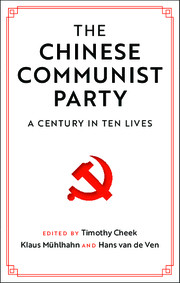Book contents
- Reviews
- The Chinese Communist Party
- The Chinese Communist Party
- Copyright page
- Contents
- Illustrations
- About the Contributors
- Acknowledgments
- Timeline of the Chinese Communist Party
- Map of China Today
- Introduction
- Chapter 1 – 1920s
- Chapter 2 – 1930s
- Chapter 3 – 1940s
- Chapter 4 – 1950s
- Chapter 5 – 1960s
- Chapter 6 – 1970s
- Chapter 7 – 1980s
- Chapter 8 – 1990s
- 8 The 1990s
- Chapter 9 – 2000s
- Chapter 10 – 2010s
- Afterword
- Appendix Selected Further Readings
- Notes
- Index
8 - The 1990s
Wang Yuanhua: A Party Intellectual Reflects
from Chapter 8 – 1990s
Published online by Cambridge University Press: 06 May 2021
- Reviews
- The Chinese Communist Party
- The Chinese Communist Party
- Copyright page
- Contents
- Illustrations
- About the Contributors
- Acknowledgments
- Timeline of the Chinese Communist Party
- Map of China Today
- Introduction
- Chapter 1 – 1920s
- Chapter 2 – 1930s
- Chapter 3 – 1940s
- Chapter 4 – 1950s
- Chapter 5 – 1960s
- Chapter 6 – 1970s
- Chapter 7 – 1980s
- Chapter 8 – 1990s
- 8 The 1990s
- Chapter 9 – 2000s
- Chapter 10 – 2010s
- Afterword
- Appendix Selected Further Readings
- Notes
- Index
Summary
Chapter 8 focuses on Wang Yuanhua, a Party scholar and celebrated initiator of the intellectual liberation and New Enlightenment movements of the 1980s. In the 1990s Wang was active in Party ideological debates as intellectuals rebounded from the repression after Tiananmen. Wang’s assessment of intellectual life in the Party comes out in his discussion of historical figures:
Du Yachuan (a conservative during the May Fourth era) and the famous late Qing reformers Kang Youwei and Liang Qichao. Writing inside China and under Party rule, Wang holds these historical examples up as contrasting models for intellectual integrity under authoritarian regimes. Wang’s own path from Christian schoolboy to Marxist revolutionary to moderate liberal offers a characteristic example of the winding path of Chinese intellectuals over the course of the 20th century. Wang’s formative years were at Tsinghua University in Peking, where his Japanese-educated father taught English. Having joined the Party in the 1930s, Wang fell from grace during the anti-Hu Feng campaign in 1955, and his refusal to implicate the disgraced writer as counterrevolutionary put Wang in the political doghouse for two decades. Yet he returned to Party service after Mao’s death, but became an advocate for thought liberation in the 1980s and for Chinese liberalism in the 1990s.
Keywords
- Type
- Chapter
- Information
- The Chinese Communist PartyA Century in Ten Lives, pp. 175 - 190Publisher: Cambridge University PressPrint publication year: 2021
- 1
- Cited by

